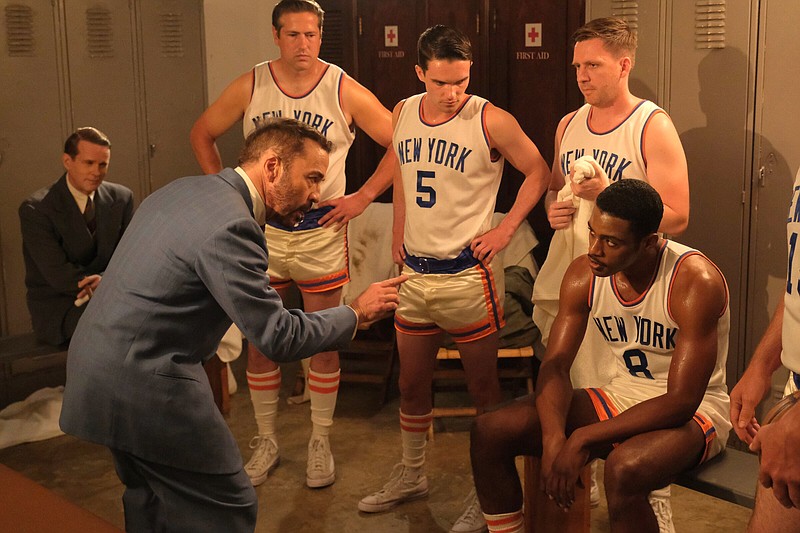The latest in the seemingly endless line of sports biographies happens to be one of my favorites of the recent batch. "Sweetwater" from writer-director Martin Guigui tells the powerful true story of Nathaniel "Sweetwater" Clifton, a naturally gifted and talented basketball player who was among the first Black men to play in the National Basketball Association.
Born Oct. 13, 1922, in England, Ark., Nate Clifton earned his nickname "Sweetwater" from his unquenchable love for sugar water and his kindhearted and easygoing demeanor. He and his family would eventually move to Chicago where he excelled in high school basketball and football.
Clifton would go on to attend college at Xavier University of Louisiana before serving three years in the Army during World War II. After playing for the Harlem Globetrotters, he would sign a contract with the New York Knicks. He played his first game in the NBA on Nov. 4, 1950, helping to break the color barrier and open the door for countless other players.
In many ways, "Sweetwater" fits right into that familiar sports drama mold. It has a moving true story as its inspiration. There's plenty of drama added in for effect. It has that uplifting crowd-pleasing ending that we've come to expect from these kinds of movies. Yet there's something truly endearing about Guigui's storytelling (minus a small hiccup or two). It's a story he has been wanting to bring to the big screen since 2006, and you can sense his enthusiasm throughout.
The story is loosely framed within a conversation between a sportswriter and a cab driver. In 1990 Chicago the writer hops into a taxi. On the radio the Chicago Bulls have just beaten the Detroit Pistons. It leads to the writer and cabbie striking up a conversation about Michael Jordan and the players who paved the way for him. Most notably, Sweetwater Clifton.
From there the story takes us back to 1949 New York. The Harlem Globetrotters and their star Sweetwater (well played by Everett Osborne) are taking on the NBA Champ Minneapolis Lakers in front of a packed house at Madison Square Garden. In attendance is Ned Irish (Carl Elwes), the owner and president of the NBA's New York Knicks, and Joe Lapchick (Jeremy Piven), a former player and the Knicks' head coach.
The Globetrotters were a traveling basketball team founded and owned by businessman Abe Saperstein (Kevin Pollak). Despite being considered by many to be the best team in the world, the Globetrotters were denied entry into the all-white NBA simply because their players were Black and they played a "razzle-dazzle" style of basketball. So Abe took them on the road where they played in everything from big city arenas to small barns in the boondocks.
While basketball plays a big part of the story, Guigui often looks beyond the sport, putting a lot of effort into portraying the various shades of racism these young men faced. While people loved to watch the Globetrotters play for their entertainment, the team still couldn't get a hotel room or buy gas at a country gas station. They were turned away from certain clubs and were denied tables at restaurants. Even their payouts for performing were far less than the predominantly white teams they were playing against.
After watching Sweetwater play, Ned and Joe immediately realize he's something special. Joe wants him to play for the Knicks, but Ned is a bit hesitant, unsure of the kind of heat he'll receive from the league's other team owners. He does seem to have one ally -- Maurice Podoloff (Richard Dreyfuss), the president of the National Basketball Association. A chunk of the film sheds light on the behind the scenes efforts to get Sweetwater into a Knicks uniform, from the internal debates between Ned and Joe to the boardroom squabbles with other ownership. It's not the most dramatic part of the story, but I was glued to it.
While the movie does a good job capturing the essence of Nate Clifton's journey, it dramatically changes many of the true-life details. This comes out most in the last 15 minutes when Sweetwater steps onto an NBA court for the first time. Guigui puts a lot of his own spin on the story, changing the team the Knicks played against and even the outcome of the game itself. There's also some cheesy announcing thrown in and the final-act sentiment is knee-deep. Still, it's the ending we're rooting for, especially after being given such a clear-eyed depiction of the racism, belittlement, and threats of violence Sweetwater faced. And all because he wanted to play the game of basketball.
